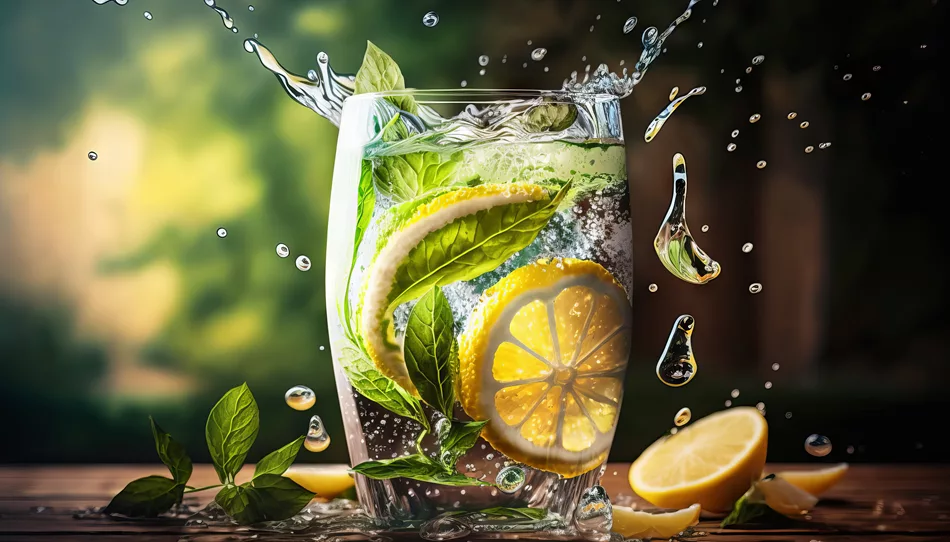The human body has a highly sophisticated detoxification system that continuously works to eliminate toxins and maintain optimal health. The liver, kidneys, intestines, lungs, and skin all play a role in filtering and excreting harmful substances. However, modern lifestyles, poor diets, and exposure to environmental toxins can place additional burdens on these detox systems. Understanding how detoxification works and how to support it naturally can enhance overall well-being.
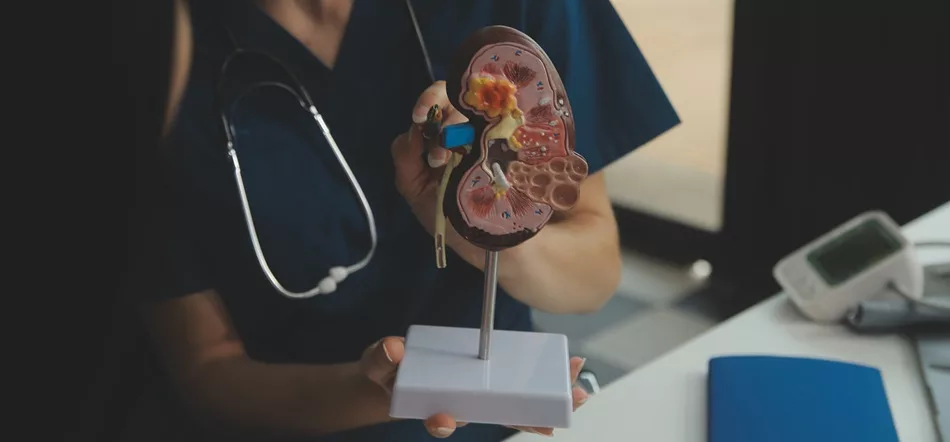
The Body’s Natural Detoxification Systems
- Liver
- The liver is the primary detoxification organ, responsible for metabolising toxins and breaking them down for elimination. It performs two crucial phases of detoxification:
- Phase 1 Detoxification (Oxidation): Enzymes from the cytochrome P450 family transform fat-soluble toxins into intermediate metabolites. This step can generate free radicals, which, if not neutralised, may contribute to oxidative stress and inflammation.
- Phase 2 Detoxification (Conjugation): The liver attaches molecules like glutathione, sulfate, or glycine to these metabolites, making them water-soluble so they can be excreted through urine or bile.
- The liver is the primary detoxification organ, responsible for metabolising toxins and breaking them down for elimination. It performs two crucial phases of detoxification:
- Kidneys
- The kidneys filter blood, removing water-soluble toxins and waste products that are excreted through urine. Adequate hydration is essential for kidney function and effective toxin elimination.
- Intestines
- The gut eliminates toxins through bowel movements. A high-fibre diet supports this process by binding toxins and preventing their reabsorption into the bloodstream.
- Lungs
- The lungs expel volatile compounds and environmental pollutants through exhalation. Deep breathing exercises and avoiding polluted environments help maintain lung detoxification efficiency.
- Skin
- Sweat glands help eliminate toxins through perspiration. Regular exercise and sauna therapy can enhance this process.
Debunking Detox Myths
- Juice Cleanses “Flush Out Toxins” – While juices may provide antioxidants, they lack essential proteins and fibres needed to support liver detoxification and gut health. Instead, opt for whole fruits, or if you prefer a drink, make a smoothie. Smoothies retain fibre, helping with digestion and detoxification while also providing a more balanced macronutrient profile.
- Colon Cleanses Remove “Toxic Waste Build-Up” – The colon naturally eliminates waste, and excessive cleansing can disrupt the gut microbiome. A better approach is to eat fibre-rich foods such as whole grains, legumes, and vegetables, which support regular bowel movements and help the body naturally eliminate waste without disrupting gut health.
- Drinking “Detox Teas” Rapidly Eliminates Toxins – Most detox teas contain diuretics or laxatives that lead to fluid loss, not actual toxin removal. Instead, focus on staying hydrated with plain water, herbal teas without laxatives, and antioxidant-rich beverages like green tea, which supports liver function without causing dehydration.
How to Support Natural Detoxification
Rather than relying on fads, long-term dietary and lifestyle habits can optimise the body’s detox systems:- Eat Nutrient-Dense Foods
- Cruciferous vegetables (broccoli, kale, Brussels sprouts) support liver detoxification enzymes.
- Garlic and onions contain sulfur compounds that aid detoxification.
- High-fibre foods (oats, beans, flaxseeds) help bind toxins and improve bowel movements.
- Stay Hydrated
- Water is essential for kidney filtration and helps flush toxins out of the body through urine.
- Exercise Regularly
- Physical activity promotes circulation, lymphatic drainage, and sweating, assisting detoxification.
- Prioritise Sleep
- During sleep, the brain clears metabolic waste through the glymphatic system, reducing the risk of neurodegenerative diseases.
- Manage Stress
- Chronic stress increases inflammation, impairing detoxification pathways. Meditation, deep breathing, and relaxation techniques can help.
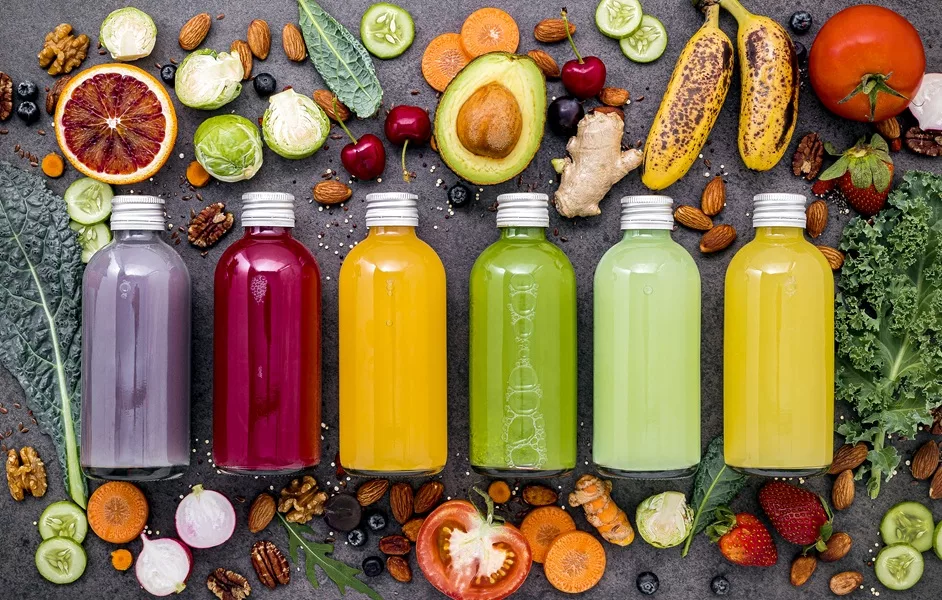
Role of Supplements in Detoxification
While a balanced diet is key, some supplements have been studied for their role in supporting detoxification:
- Choline
- Essential for fat metabolism in the liver and helps prevent non-alcoholic
fatty liver disease (NAFLD). - Supports detoxification by promoting cell membrane integrity and liver
function.
- Essential for fat metabolism in the liver and helps prevent non-alcoholic
- Glutathione
- The primary antioxidant in the liver that binds to toxins and
facilitates their excretion. - Low glutathione levels are associated with increased oxidative stress and
toxin accumulation.
- The primary antioxidant in the liver that binds to toxins and
- N-Acetyl L-Cysteine (NAC)
- NAC is a precursor to glutathione, the body’s master antioxidant. It
plays a key role in Phase 2 liver detoxification by neutralising heavy
metals, environmental toxins, and oxidative stress.
- NAC is a precursor to glutathione, the body’s master antioxidant. It
- NAC is widely used in medical settings to treat acetaminophen Milk Thistle (Silymarin)
- One of the most researched herbs for liver health, milk thistle helps
regenerate liver cells and protects against toxin-induced damage. - Used as an adjunct therapy for liver diseases such as cirrhosis and hepatitis.
- toxicity,
demonstrating its ability to support liver health.
- One of the most researched herbs for liver health, milk thistle helps
- Turmeric Extract (Curcumin)
- Curcumin is a potent anti-inflammatory and antioxidant that enhances liver
enzyme activity and protects against oxidative damage. - Studies suggest that curcumin supports bile production, aiding digestion
and the elimination of fat-soluble toxins.
- Curcumin is a potent anti-inflammatory and antioxidant that enhances liver
- Artichoke Leaf Extract
- Contains cynarin, which promotes bile flow and supports digestion
and toxin elimination. - Artichoke also has antioxidant properties that protect liver cells from damage.
- Contains cynarin, which promotes bile flow and supports digestion
- Dandelion Root Extract
- Acts as a natural diuretic, supporting kidney function and fluid
balance. - Contains antioxidants that may aid in reducing liver inflammation.
- Acts as a natural diuretic, supporting kidney function and fluid
Support Your Liver with LiverGuard+
VitaV’s LiverGuard+ combines clinically studied detox-supporting ingredients, including NAC, Turmeric Extract, Artichoke Leaf Extract, Garlic Bulb Extract, Dandelion Root Extract, Choline, Zinc, Selenium, and Vitamin E. These ingredients work synergistically to support liver function, antioxidant defence, and detoxification pathways.
Explore LiverGuard+ to optimise your liver health today.
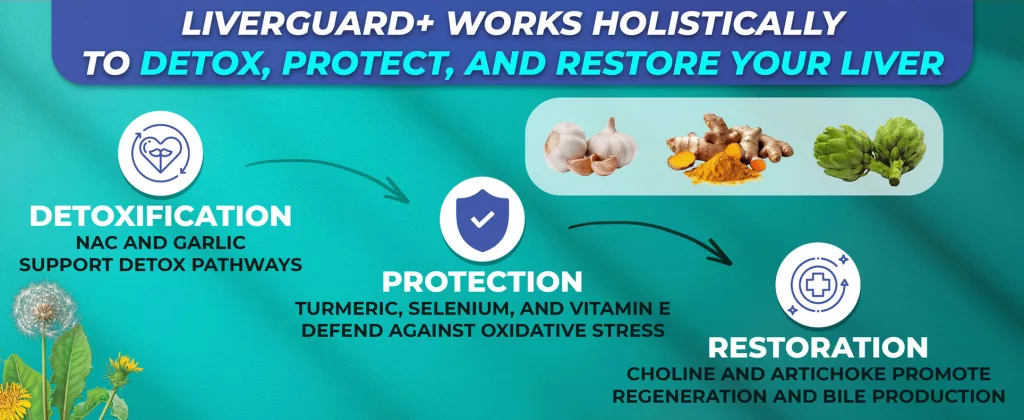
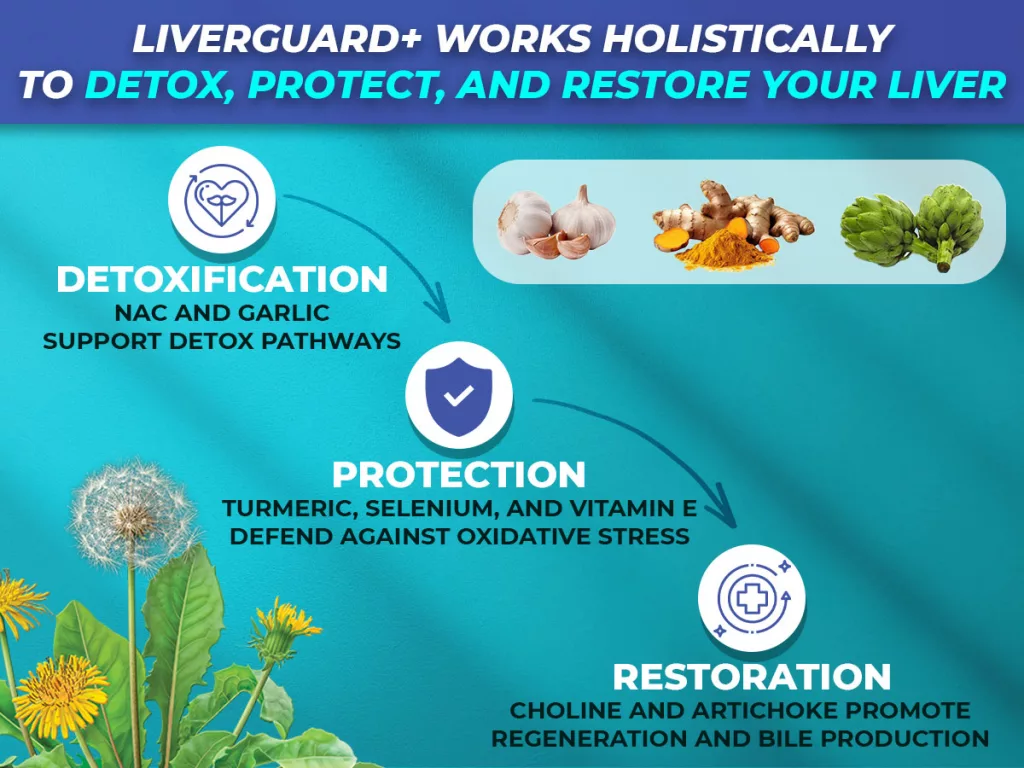
References
- Pamuk GE, Sonsuz A. N-acetylcysteine in the treatment of non-alcoholic steatohepatitis. J Gastroenterol Hepatol. 2003 Oct;18(10):1220-1. PMID: 12974918
- Panahi Y, Kianpour P, Mohtashami R, Jafari R, Simental-Mendía LE, Sahebkar A. Efficacy and Safety of Phytosomal Curcumin in Non-Alcoholic Fatty Liver Disease: A Randomized Controlled Trial. Drug Res (Stuttg). 2017 Apr;67(4):244-251. PMID: 28158893
- Panahi Y, Kianpour P, Mohtashami R, Atkin SL, Butler AE, Jafari R, Badeli R, Sahebkar A. Efficacy of artichoke leaf extract in non-alcoholic fatty liver disease: A pilot double-blind randomized controlled trial. Phytother Res. 2018 Jul;32(7):1382-1387. PMID: 29520889
- You Y, Yoo S, Yoon HG, Park J, Lee YH, Kim S, Oh KT, Lee J, Cho HY, Jun W. In vitro and in vivo hepatoprotective effects of the aqueous extract from Taraxacum officinale (dandelion) root against alcohol-induced oxidative stress. Food Chem Toxicol. 2010 Jun;48(6):1632-7. 27. PMID: 20347918
- Al Rajabi A, Castro GS, da Silva RP, Nelson RC, Thiesen A, Vannucchi H, Vine DF, Proctor SD, Field CJ, Curtis JM, Jacobs RL. Choline supplementation protects against liver damage by normalizing cholesterol metabolism in Pemt/Ldlr knockout mice fed a high-fat diet. J Nutr. 2014 Mar;144(3):252-7. PMID: 24368431
- Ferenci P. Silymarin in the treatment of liver diseases: What is the clinical evidence? Clin Liver Dis (Hoboken). 2016 Jan 29;7(1):8-10. PMCID: PMC6490246
- Honda Y, Kessoku T, Sumida Y, Kobayashi T, Kato T, Ogawa Y, Tomeno W, Imajo K, Fujita K, Yoneda M, Kataoka K, Taguri M, Yamanaka T, Seko Y, Tanaka S, Saito S, Ono M, Oeda S, Eguchi Y, Aoi W, Sato K, Itoh Y, Nakajima A. Efficacy of glutathione for the treatment of nonalcoholic fatty liver disease: an open-label, single-arm, multicenter, pilot study. BMC Gastroenterol. 2017 Aug 8;17(1):96. PMID: 28789631
Disclaimer: This content is for informational purposes only and does not constitute medical advice. Food supplements should not be used as a substitute for a balanced diet. If you have any health conditions or are taking medications, consult with your healthcare provider before making any dietary or lifestyle changes.
